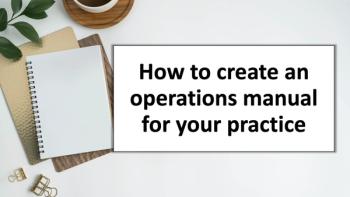
Managing Call
Many practices struggle with the logistics of call scheduling.
With 130 physicians in 16 locations, Phyllis Robertson has her hands full creating a call schedule. Robertson is supervisor in appointments for The Jackson Clinic, a multispecialty group in Jackson, Tenn. "Everyone wants the same number of weekend days, wants to be spaced evenly - they don't want to have call every two or three days. If there are 18 doctors in the department, they basically want call every 18 days," she explains.
But compound that plan with vacations, swapped call, physicians in more than one department needing multiple schedules that don't overlap, and - most dramatically - the fact that "each doctor might have his own notion about what he thinks is fair call."
Robertson isn't alone with her scheduling headache. Many practices struggle with the logistics of call scheduling. Even more struggle with the emotional issues around call. As Robertson notes, each physician does have his or her own idea of fair - and that's a recipe for pitched battles when you're talking about how physicians spend their evenings and weekends.
Let's take a look at why call is such an issue and what to do to reduce the paperwork and arguments it causes.
Why so mad?
Why do things get so bitter? Because call can be so taxing to physicians who already feel overworked. Asked their opinion of call, 51 percent of primary-care physicians describe it as "sometimes brutal" or "demanding," according to an Advisory Publications poll (see graph page, 70).
Given that attitude, making sure everyone in a practice feels the call burden is being distributed fairly is no easy task. Any call at all seems painful; taking an hour more than a colleague seems like an unheard of imposition. That's why call can put normally compatible partners at one another's throats.
Compounding matters is a change in the attitudes of younger physicians toward work-life balance issues, and the relationship between physicians of different generations. In the old days, established physicians could pawn at least some call duty off on their new, younger partners. While fairness was still certainly a concern, there also was community consensus that long hours and working weekends were just part of a physician's life - and especially for young physicians. No more.
Today's generation of physicians insist on balance. When picking a practice to join, final-year residents weigh adequate call coverage and a good lifestyle far more heavily than even good compensation, according to a survey by physician recruiting firm, Merritt, Hawkins and Associates (see graph, page 70). They also balk at working more weekends than everyone else just because they are new.
Generational differences aside, all physicians these days are already so tapped out and exhausted that call is just the last straw. Fights are to be expected.
Settle the fights
The first step in settling debates over call is to abandon the idea that there is an objectively fair call schedule. A physician's idea of fairness depends almost entirely on her point of view. Your senior physician will endlessly defend his right to take a less-than-even split of call duty. Your newest physician will be appalled that someone could dare assume that her call duty should be more than anyone else's. You can't break up the fight based on claims of objective fairness or "national standards."
Instead, negotiate. Strive to find an agreement that everyone can live with, not one that everyone agrees is ideal.
Call models
Here are some call-scheduling ideas to consider. I've seen all these models - and sometimes combinations of them - at use in practices.
- Even split. The most common method for handling call is the one The Jackson Clinic uses. Physicians rotate days evenly, taking a day each with an even split between weekends and weekdays. It sounds as reasonable as can be. But it doesn't usually work out quite right. Someone is always on vacation, or can't do call her day for one legitimate reason or another, or his Monday shift falls on Christmas Eve. You can balance this out somewhat by giving each physician a certain number of weekday, weeknight, weekend, or holiday shifts over the course of a year, but that complicates the scheduling significantly.
- By the week. A similar model puts each physician on call for a full week. That makes for less dickering over evenings and weekends - everyone gets them. But if your practice takes a lot of call, you will have one exhausted physician at the end of each week. Not to mention that many families find it hard to count a member out for an entire week.
- All mine. Some practices ask physicians to cover call whenever one of their own patients calls in. That certainly seems fair - unless you are the one physician in your group willing to take on pediatric or medically complex patients. Then you have more call than you like. Even if that isn't the case, none of the physicians in the practice ever really feels free to take a spontaneous weekend getaway or promise their spouse an uninterrupted evening out. If the phone rings, they have to go.
- Paid call. It's fair to make someone take extra call if you pay for it, right? Some practices do pay for additional call. The prices and pricing strategies vary. Most include a set amount in annual salary. Others offer $500 to $24,000 month, a rate based on the going costs for locum tenens, an hourly rate, or a percent of practice net revenue based on amount of call taken. Usually, partners don't get any pay; it's an option for employed physicians. The trouble with paying is that most physicians don't want more call no matter how much they could earn from it.
- Weighted call. Another option is to weight the value of days and give everyone the same sum. For example, a weekday evening might have a value of 1. New Year's Eve? 10. Most Saturday nights? 5. Get everyone to agree on the weights and make sure everyone ends up with the same total value at year-end.
It may be easier to agree on sharing call if there is less work involved in each session. You can't make all patients stay well all the time, but you can use nonphysician providers (well-reimbursed and with written protocols in hand) to take first call - to pick up calls, answer what they can, and forward only what is outside their scope to a physician. Or you can track your call to see if there are processes you can improve. Why are people calling? Could you provide patients with written materials during appointments that answer questions or fears that tend to lead to unnecessary midnight phone calls?
Technology can help, too. Having access to an EMR from home and hospital greatly increases the safety and convenience of call. In most fields of medicine, you'll have to leave home less often if you are able to depend on a medical history, X-rays, and drug history on a screen in your den.
Technology helps
These models should get you started on negotiating a call-scheduling system that everyone can live with, if not love. But, as Phyllis Robertson found, even having rules doesn't mean it's easy to actually schedule when everyone is on and off. The Jackson Clinic eased its burden somewhat with call-scheduling software. The practice finds it a great improvement over paper-based scheduling.
When working in paper, reports information systems director Jan Matthews, "We'd write in doctors' names who were on call - and when they needed to swap call with somebody, we'd hope to goodness that we got all that information on all the copies we sent out." A simple change required 86 new copies of the schedule and at least five or six phone calls just to get it done, says Matthews. "We spent several weeks, sometimes months, trying to get it balanced."
The software allows users to enter scheduling rules along with planned vacations, then plays the schedule out from there, making sure everyone has the pre-established percentage of duties and appropriate breaks. Robertson says she now schedules the urgent clinic in a matter of two to four hours instead of three to four weeks.
"No doubt, electronic scheduling should be the goal," Matthews comments, even as she recognizes that some physicians in her practice have refused or not made time to learn the system, making it less efficient than it could be. Physicians could check the schedule and request vacation time online if they'd use it.
Pamela Moore, senior editor for Physicians Practice, last wrote about business tactics medicine can borrow from other industries in the October issue. She can be reached at
This article originally appeared in the November/December 2004 issue of Physicians Practice.
Newsletter
Optimize your practice with the Physicians Practice newsletter, offering management pearls, leadership tips, and business strategies tailored for practice administrators and physicians of any specialty.






